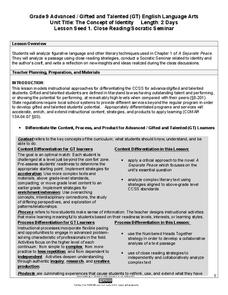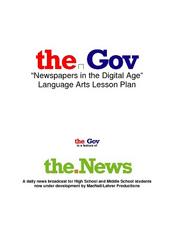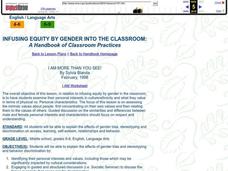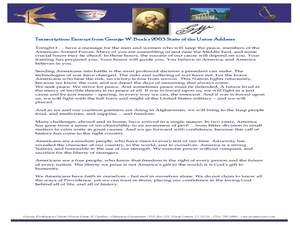Facing History and Ourselves
Socratic Seminar
New to the socratic seminar format? Check out a resource that not only provides the rationale for the procedure and step-by-step directions, but also provides a list of suggested topics, rules and model statements.
Curated OER
Socratic Seminars in English Class
What is a Socratic Seminar? Discover this type of discussion and it functions. Split the class into two groups with Group A sitting in an inner circle and Group B in an outer circle. Each person in Group B is assigned to a person in...
Ford's Theatre
Socratic Seminar/Group Discussion: The Crisis of the Civil War
High schoolers work in four different groups to examine the many factors that led to the American Civil War. They research an assigned topic, prepare questions, and finally engage in a class discussion using the Socratic Seminar method.
Maryland Department of Education
The Concept of Identity Lesson 1: Close Reading/Socratic Seminar
John Knowles' A Separate Peace provides readers with an opportunity to develop their close reading and analytical skills as they look for what Knowles feels are the factors that shape our identity.
PBS
Their Eyes Were Watching God: Socratic Seminar
A Socratic seminar wraps-up a study of Zora Neale Hurston' Their Eyes were Watching God. Using the text and their notes, scholars focus on how characters in the novel accept or reject the societal norms of the times.
Curated OER
Socratic Seminar on Martin Luther King, Jr.’s Letter From Birmingham Jail
Key in the struggle to gain the rights of democratic citizenship was the April 1963 arrest of Dr. Martin Luther King, Jr. for civil disobedience. To deepen their knowledge and understanding of events during the civil rights movement,...
Maryland Department of Education
The Concept of Diversity in World Literature Lesson 10: Author's Purpose Seminar
Why did Chinua Achebe write "An Image of Africa: Racism in Conrad's Heart of Darkness" in response to Conrad's novel? As part of a study of Things Fall Apart, class members conduct a socratic seminar focused on Achebe's purpose and...
Curated OER
Socratic Seminar
To conclude their study of the letters of Abigail Adams, class members engage in a Socratic seminar where they discuss her writings and what her letters reveal about her.
Brigham Young University
Socratic Seminar for Cold Sassy Tree
Tired of giving the same old multiple-choice tests, and have the urge for a new assessment? Then bring the precision of a Socratic seminar into your classroom. Even if you did not read Cold Sassy Tree the organization and explanation on...
K20 LEARN
Lord of the Flies Unit, Lesson 7: Good To Be Bad
The seventh lesson in the Lord of the Flies unit asks scholars to consider whether or not an individual can overcome the worst thing they have ever done. Groups read different articles related to the question, share their expertise in a...
C-SPAN
The Electoral College and the Constitution
What is the purpose of the Electoral College? Is it antiquated, or does it have a place in today's political climate? High schoolers view a series of video clips as they analyze the parts of the United States Constitution that address...
EngageNY
Preparation for End of Unit Assessment: Making Connections between Song Lyrics and Texts, Part 2
Five hundred schoolchildren first performed the song "Lift Every Voice and Sing" in 1900 to celebrate President Lincoln's birthday. Scholars listen to the historic song and discuss the lyrics with partners. They continue preparing notes...
Bonneville
Why Use Renewable Energy?
Renew one's interest in renewable energy sources. Scholars learn about the advantages and disadvantages of various renewable and non-renewable energy sources. They conduct an activity to simulate the greenhouse effect and take part in a...
EngageNY
Preparation for End of Unit Assessment: Making Connections between Song Lyrics and Texts, Part 1
Song lyrics can help people better understand literary texts. Scholars continue listening to "Ain't Gonna Let Nobody Turn Me Around" and discuss the connections between the song's lyrics and Carlotta Walls LaNier's memoir, A Mighty Long...
Smithsonian Institution
Hidden Histories: Mexican Repatriation During the 1930s
Mexican Repatriation: the forgotten deportation of American citizens. The resource focuses on the deportation of Mexican American citizens during the Great Depression. Young historians read documents, complete a free-write, and fill out...
Alabama Learning Exchange
J. Alfred Hyperbolizes
Mermaids will sing to your class members as they engage in an activity related to T.S. Eliot's famous dramatic interior monologue. After engaging in a socratic seminar about literary devices in the poem, individuals choose one...
C-SPAN
Jane Addams and John Dewey
Imagine living where there was eight inches of garbage on the street! These were the situations the Progressive movement sought to reform. Using video clips about John Dewey and Jane Addams, learners consider the philosophies and impact...
University of the Desert
What Is Extremism?
By participating in discussions using prompts and statements provided in the lesson plan, learners identify the concept of extremism and consider what causes violent acts of extremism in the modern world.
Curated OER
Newspapers in the Digital Age
Is journalism more or less reliable with the influx of Internet sources? Learners investigate the issues of freedom of speech, journalistic ethics, and social responsibility in the age of Twitter and Facebook. After examining the...
Virginia Department of Education
Biotechnological Issues and Bioethics
Culminate a bioethics unit with the implementation of a lesson plan that incorporates the Socratic method to encourage class feedback and participation. Pupils participate in a discussion on bioethics and morality, complete a writing...
Constitutional Rights Foundation
Refugees from the Caribbean: Cuban and Haitian “Boat People”
Should refugees fleeing poverty be allowed the same entrance into the United States as those fleeing persecution? High schoolers read about US foreign policy in the late 20th century regarding refugees from Cuba and Haiti, and engage in...
Curated OER
The Gettysburg Address
Who was Abraham Lincoln, and what is the Gettysburg Address? Sixth graders participate in a seminar where they read and analyze the Gettysburg Address and its importance. The role of Abraham Lincoln during the Civil War is also...
Curated OER
I Am More Than You See
Students discuss the effects of gender bias and stereotyping by identifying personal interests and values. In this sociology lesson, students iscuss the forces in society which cause gender discrimination, create poems about themselves,...
Curated OER
George Washington's Foreign Policy
Students compare George Washington's foreign policy to the policies of presidents who followed him. In this primary source analysis lesson, students compare Washington's Farewell Address to the Roosevelt Corollary, the Monroe Doctrine,...

























